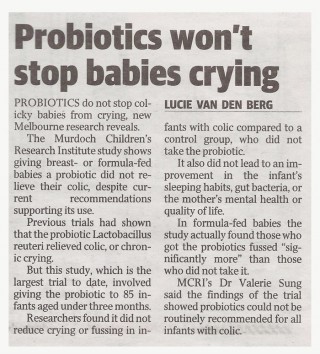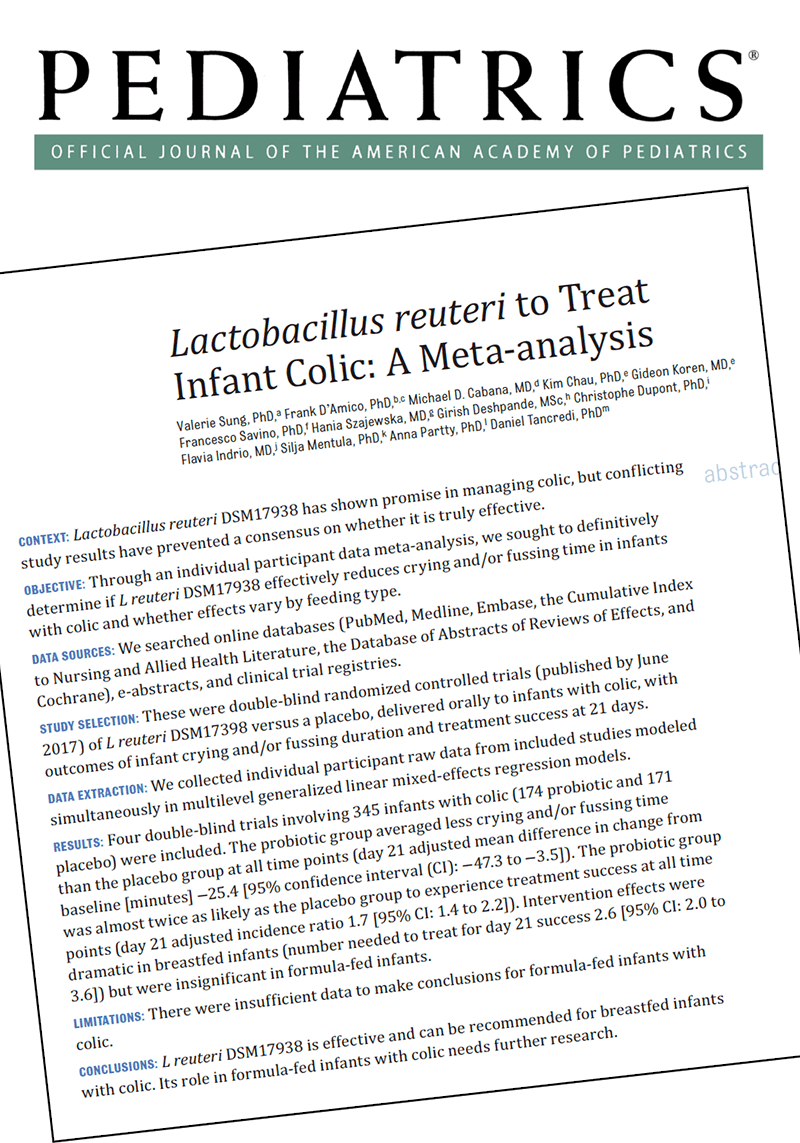
Probiotics and Colic
Lactobacillus reuteri is not effective in treating infants with colicWhat is colic?
-
Colic is excessive crying of unknown cause in babies less than 3 months old.
-
The scientific definition for colic is:
crying or fussing more than 3 hours of the day for more than 3 days of the week. -
Colic is a diagnosis that can only be made after the baby has been examined and it is felt that the baby’s crying is not due to any medical cause.
How common is colic?
Colic is very common, affecting around 1 in 5 babies less than 3 months old.
What are the symptoms of colic ?
The symptoms of colic usually start within the first few weeks of life, with the crying usually peaking at 6 to 8 weeks, then spontaneously resolving after 3 to 4 months. Parents usually report babies with colic to have unpredictable episodes of crying that are hard to soothe, often occurring in the late afternoons and evenings. The crying babies may look like they are in pain because they often draw up their legs, arch their back and pass wind, often because of swallowing air during crying.
Why do babies get colic?
No one knows why babies get colic, despite years of research. Some people think it is the extreme spectrum of normal baby crying. Some people think it is because of pain originating from the gut.Others think it is because of the baby’s temperament, affected by the mother’s mood. None of these theories have scientifically been proven to be true.
What are the effects of colic?
The most important and serious effects of colic are maternal depression and child abuse, or the Shaken Baby Syndrome. Mothers with babies with colic are usually sleep deprived, and it can be very stressful and exhausting to look after a baby who cries a lot, especially when it seems that nothing would stop the baby from crying. Mothers with babies with colic often stop breastfeeding early. Many parents try many different kinds of infant formula in the hope that they would find the right one to suit their baby.
What treatments are currently recommended for colic?
Currently, there are no effective treatment options for colic. In a small proportion of babies with colic, who usually have other symptoms in addition to their crying, excluding dairy from their mother’s diet or changing them to a dairy-free formula can sometimes work, but this doesn’t work for all babies with colic. Because nothing really works for colic, parents are often given conflicting and confusing advice. This is not helpful to parents who are already exhausted and stressed out.
Probiotics and Colic
What are probiotics, and how may they work for babies with colic?
- Probiotics are live microorganisms that are thought to be beneficial.
- It is thought that they could change the gut flora, reduce gut inflammation, and therefore maybe reduce pain in the gut.
Melbourne Research Study
Treating infant colic with the probiotic Lactobacillus reuteri: double blind, placebo controlled randomised trial
- This study was a double-blind randomised placebo-controlled trial
- We aimed to determine whether the probiotic, Lactobacillus reuteri, would be effective in reducing crying or fussing in babies less than 3 months old with colic, regardless of whether they are breastfed or formula fed.
- We recruited 167 families, and randomly allocated 85 babies to receive the probiotic, and 82 babies to receive placebo (that is, no probiotic), as 5 drops a day for 1 month.
- None of the parents or researchers knew whether the baby received the probiotic or the placebo until the study was completed.
- We also recorded how much the babies slept, their mothers’ mental health, and their families’ quality of life.
How were infants recruited in this study, over what period?
- The babies were recruited over one year from 2011 to 2012 in Melbourne, Australia, mainly from the Emergency Department of the Royal Children’s Hospital, and also through maternal child health nurses and paediatricians.
- All the babies in this study were crying or fussing more than 3 hours of the day for more than a week, and at the start of the study, they were crying or fussing an average of 330 minutes, or 5 ½ hours a day.
What does this study show?
- The study showed that unfortunately, the probiotic Lactobacillus reuteri was not effective in reducing crying or fussing in babies with colic.
- The probiotic was not effective in improving the babies’ sleep, their mother’s mental health, nor their families’ quality of life.
- There were no differences in crying or fussing time between the probiotic and placebo groups.
- The probiotic group seemed to fuss more than the placebo group during the study period.
Is Lactobacillus reuteri effective in treating infants with colic?
- Unfortunately, Lactobacillus reuteri is not effective in treating infants with colic.
Were there any differences between breastfed and formula fed babies?
- There were no differences between the breastfed and formula fed babies
- The probiotic was not effective in the breastfed nor the formula fed babies.
- The formula fed babies assigned to the probiotic group seemed to fuss more than those assigned to the placebo group.
What makes this study the first, largest and most rigorous trial?
- This study is the first, largest and most rigorous probiotic trial to include all infants with colic, whether they were breastfed or formula fed.
- The study was well designed and used validated measures of crying.
- There have been 4 other similar studies conducted in Europe and Canada which have indicated the probiotic to be effective, however these studies were much smaller, used different measures, and included only babies who were breastfed.
What implications might these findings have for the treatment of colic?
- These findings suggest that the probiotic Lactobacillus reuteri cannot be routinely recommended for all babies with colic, especially babies from Melbourne, Australia.
- It is not effective in formula fed babies with colic, and its use in breastfed babies with colic is still uncertain.
International Collaborative Study
Lactobacillus reuteri to Treat Infant Colic: A Meta-analysis
After conducting the Melbourne trial, Dr Sung led an international collaboration of researchers from 11 institutes around the world to try to establish whether certain groups of babies with colic might benefit from probiotics.
The researchers combined raw data from the Melbourne trial with those from three other similar trials from Italy, Poland and Canada. The team found that amongst breastfed babies with colic, the probiotic group was two times more likely to reduce crying by 50% by the 21st day of treatment compared to the placebo group.
However, the probiotic was not effective for the formula-fed babies with colic.
Recommendations for use of probiotics for infant colic
- Lactobacillus reuteri DSM 17938 is the only strain of probiotic shown to be effective for reducing crying in breastfed babies with colic.
- Lactobacillus reuteri DSM 17938 cannot be recommended for formula-fed babies with colic. From the Melbourne research, formula-fed babies with colic in the probiotic group seemed to cry/fuss more than the placebo group.
- Lactobacillus reuteri DSM 17938 has not been shown to be effective for reducing crying in babies with colic in Melbourne, whether breastfed or formula-fed.
- Parents who are worried about their baby’s crying should see a doctor to rule out any underlying medical causes. Parents should know that the crying peaks at 6-8 weeks and resolves by 3-4 months. During this challenging time, parents need maximal support from family and friends. For babies less than 3 months old who are exclusively breastfed, a 3-4 week trial of Lactobacillus reuteri DSM 17938 may be considered. It is given as 5 drops a day directly into the baby’s mouth.
Sorry, no posts matched your criteria.
Study Reference
Melbourne Study
- Sung V, Hiscock H, Tang MLK, Mensah FK, Nation ML, Satzke C, Heine RG, Stock A, Barr RG, Wake M. Treating infant colic with the probiotic Lactobacillus reuteri: a randomised double-blind placebo-controlled trial. BMJ 2014;348:g2107
View Full Journal Article
International Collaborative Study
- Sung V, D’Amico F, Cabana MD, et al. Lactobacillus reuteri to Treat Infant Colic: A Meta-analysis Pediatrics. 2018;141(1):e20171811
View Full Journal Article
Dr Valerie Sung is a General and Developmental / Behavioural Paediatrician practicing at Melbourne Paediatric Specialists.



